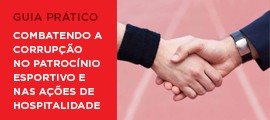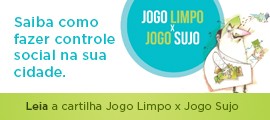 Strategies
Strategies
The Clean Games Inside and Outside the Stadiums Project is an initiative led by the Ethos Institute, with the support of the Siemens Integrity Initiative. Between 2011 and 2016, more than US$ 3 million will be invested in actions to increase transparency, integrity and social control over money invested in the country to build infrastructure for the 2014 World Cup and the 2016 Olympic Games.
To plan, guide and implement its actions, the Clean Games Project established a number of committees: the National Coordination and Mobilization Committee, four National Thematic Committees and 12 Local Committees, one in each host city of the 2014 World Cup. The National Thematic Committees are: Legal Committee; Companies and Investors Committee; Sports and Athletes Committee; Media Committee.
The Clean Games Project developed five main strategies to foster integrity, transparency and social control over expenditure on the 2014 World Cup:
1) Establishing Sectoral Agreements:
Sectoral agreements are self-regulation mechanisms among signatory companies to enhance integrity in public-private relationships and to counter corruption and bribery. Agreements will be implemented in the Health (hospital equipment), Construction, Energy, and Transportation sectors.
2) Creating Local Administration Transparency Indicators
Information that host cities need to make public so that citizens and civil society organizations can verify the ethical conduct of companies and the public sector. Information will include data from infrastructure works, as well as from specific legislation and from the Sectoral Agreements.
3) Local Administration Transparency Pacts
Mayor candidates of the 12 host cities for the 2012 municipal elections will be called to make commitments and set goals based on the Local Administration Transparency Indicators, on the accountability of their campaigns and on the social control of investments in the World Cup and the Olympics.
4) Fostering Social Control
Creating tools to aid social control of public expenditure. Among these tools there are publications explaining, in plain language, how to read bid contracts and the most usual ways of breaching the rules of public works. The project’s website and the Hotline are also some of these tools.
5) Mobilization
Awareness-raising and engagement of citizens, social organizations and the business sector to improve anti-corruption laws. Some regulatory frameworks that have been introduced in the Congress are: Bill 1202/2007, on lobby regulation; Bill 5228/2009, on access to information, and Bill 8626/2010, on Responsibility of Corporations for Corruption Acts.




Siga: